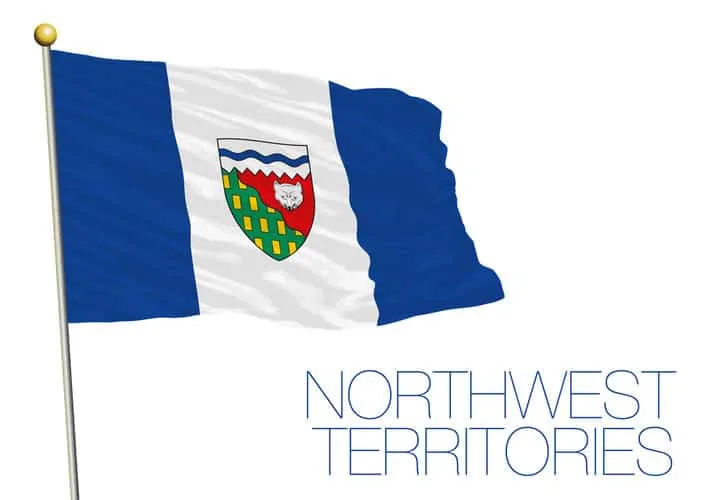The minimum wage in Canada is the lowest hourly wage an employer can legally pay an employee, whether they work part-time or full-time.
Ranging from $14.00 to $16.77, the minimum wage varies by province and territory, as each jurisdiction has its own labour laws that determine the minimum pay workers receive, employee rights and working conditions, the minimum age to work, and more.
This article covers the current minimum wage in all ten provinces and three territories in Canada in 2024. It also highlights exceptions to the minimum wage, taxes, and how the minimum wage is calculated.
Key Takeaways
- The minimum wage in Canada varies by province or territory and ranges from $14.00 to $16.77. Saskatchewan has the lowest minimum wage, and Yukon has the highest.
- In some provinces and territories, the minimum wage varies depending on the industry or the age of the employee.
Minimum Wages in Canada 2024 Summary
| Province | Minimum Wage | Effective Date |
|---|---|---|
| Alberta | $15.00 per hour | As of October 1, 2018 |
| British Columbia | $16.75 per hour | As of June 1, 2023 |
| Manitoba | $15.30 per hour | As of October 1, 2023 |
| New Brunswick | $14.75 per hour | As of April 1, 2023 |
| Newfoundland and Labrador | $15.00 per hour | As of October 1, 2023 |
| Northwest Territories | $16.05 per hour | As of September 1, 2023 |
| Nova Scotia | $15.00 per hour | As of October 1, 2023 |
| Nunavut | $16.00 per hour | As of April 1, 2020 |
| Ontario | $16.55 per hour | As of October 1, 2023 |
| Prince Edward Island | $15.00 per hour | As of October 1, 2023 |
| Quebec | $15.25 per hour | As of May 1, 2023 |
| Saskatchewan | $14.00 per hour | As of October 1, 2023 |
| Yukon | $16.77 per hour | As of April 1, 2023 |
1. Minimum Wage in Ontario 2024

Ontario is Canada’s most populous province, with an estimated population of 15,386,407 people as per Statistics Canada.
The province has the highest total Gross Domestic Product (GDP) of all the provinces and is a major manufacturing hub.
The minimum wage rate in Ontario is currently $16.55 per hour. The minimum wage increased on October 1, 2023, based on the Ontario Consumer Price Index.
Minimum wage rates in Ontario are tied to the Ontario Consumer Price Index.
Ontario Minimum Wage History
Ontario’s minimum wage rates over the last ten updates are as follows:
- October 1, 2023: $16.55
- October 1, 2022: $15.50
- January 1, 2021: $15.00
- October 1, 2021: $14.35
- October 1, 2020: $14.25
- October 1, 2018: $14.00
- October 1, 2017: $11.60
- October 1, 2016: $11.40
- October 1, 2015: $11.25
- June 1, 2014: $11.00
- March 31, 2010: $10.25
Minimum Wage Exemptions in Ontario
Some types of employees have minimum wages different from the general rate.
In Ontario, students under 18 years of age who work 28 hours or less per week earn a minimum wage of $15.60 per hour. Liquor servers earn the same minimum wage of $16.55 per hour, and homeworkers earn $18.20 per hour.
There are also different minimum wages for hunting and fishing guides and wilderness guides.
Employers who offer their employees room and board may consider up to a designated amount to have been paid as wages.
For more information on minimum wages and employment standards in Ontario, click here.
Related: Ontario Tax Brackets
2. Minimum Wage in Alberta 2024

Alberta has the fourth-largest population in Canada, with an estimated 4,647,178 people in the first quarter of 2023, as per Statistics Canada.
The province has the third-largest total GDP, and it has a significant agricultural, oil and gas, and tourism industry.
The minimum wage in Alberta is $15.00 per hour.
The previous NDP government raised the minimum wage in Alberta from $10.20 per hour to $15 over a 3-year period (2015-2018).
Alberta Minimum Wage History
Alberta’s minimum wage over the years is as follows:
- October 1, 2018: $15
- October 1, 2017: $13.60
- October 1, 2016: $12.20
- October 1, 2015: $11.20
- September 1, 2014: $10.20
- September 1, 2013: $9.95
- September 1, 2012: $9.75
- September 1, 2011: $9.40
Minimum Wage Exemptions in Alberta
While all employers must pay a minimum of $15 per hour to their workers, there are some exceptions.
Students under 18 years of age who work 28 hours per week or less can be paid $13.00 per hour. Salespersons must earn at least $598 per week, and domestic employees who live in their employer’s home must earn at least $2,848 per month.
Employers who provide room and/or board (meals) can deduct up to $4.41 per night of lodging and $3.55 per meal.
Incentive-based pay or commission-based pay must meet at least the minimum wage per hour worked.
Some occupations are exempt from minimum wage standards, including real estate brokers, some students in work experience or off-campus education programs, municipal police service members, post-secondary academic staff, securities salespersons, and extras in a film or video production.
For more information about the minimum wage rates and employment standards in Alberta, click here.
Related: Alberta Tax Brackets and Tax Rates
3. Minimum Wage in Manitoba 2024

Manitoba has the fifth-largest population in Canada, with an estimated 1,431,792 people.
The province has the sixth-largest total GDP, and its economy relies heavily on agriculture, hydroelectricity, natural resources, and manufacturing.
The minimum wage in Manitoba is $15.30 per hour. Increases in the minimum wage are based on the province’s Consumer Price Index.
Manitoba Minimum Wage History
Manitoba’s minimum pay rates over the last decade are:
- October 1, 2023: $15.30
- April 1, 2023: $14.15
- October 1, 2022: $13.50
- October 1, 2021: $11.95
- October 1, 2020: $11.90
- October 1, 2019: $11.65
- October 1, 2018: $11.35
- October 1, 2017: $11.15
- October 1, 2015: $11.00
- October 1, 2014: $10.70
- October 1, 2013: $10.45
- October 1, 2012: $10.25
- October 1, 2011: $10.00
Minimum Wage Exemptions in Manitoba
In Manitoba, the minimum wage of $13.50 applies to all employees regardless of their age, with some exceptions.
The minimum wage for workers in the heavy construction sector depends on their job classification. There are a total of 10 job classifications in the heavy construction industry, and minimum wages range from $12.75 to $25.25.
Domestic workers who work less than 12 hours a week and election officials or enumerators appointed under The Elections Act are excluded from minimum wage.
Flat-rate mechanics and commission salespeople who are paid by incentive must earn the minimum wage in each pay period.
Employers can deduct the cost of room and meals up to a certain limit. For more information about Manitoba’s minimum wage and employment standards, click here.
Related: Manitoba’s Tax Brackets and Rates
4. Minimum Wage in British Columbia 2024

British Columbia has an estimated population of 5,399,118 people, making it the third most populous province in Canada.
It has the fourth-largest economy in the country, with major industries including agriculture, aerospace, forestry, information technology, mining, tourism, and more.
The minimum wage in British Columbia is one of the highest in Canada at $16.75 per hour.
British Columbia Minimum Wage History
Four increases were planned to increase the minimum wage from $12.65 in 2018 to $15.20 by June 1, 2021. Since then, BC’s minimum income has risen to become the second highest in Canada.
The rates over the last decade are as follows:
- June 1, 2023: $16.75
- June 1, 2022: $15.65
- June 1, 2021: $15.20
- June 1, 2020: $14.60
- June 1, 2019: $13.85
- June 1, 2018: $12.65
- September 15, 2017: $11.35
- September 15, 2016: $10.85
- September 15, 2015: $10.45
- May 1, 2012: $10.25
- November 1, 2011: $9.50
Minimum Wage Exemptions in British Columbia
The minimum wage for liquor servers is $16.75 per hour as of June 1, 2023. This amount is in addition to tips or gratuities received.
Live-in camp leaders are paid a minimum daily rate of $133.69 per day.
Live-in-home support workers are paid a minimum rate of $124.73 per day or part day worked.
Resident caretakers are paid a minimum wage per month based on the number of suites in their apartment buildings.
For more information about the minimum wage and employment standards in British Columbia, click here.
Related: British Columbia Training and Education Savings Grant
5. Minimum Wage in Saskatchewan 2024

Saskatchewan’s population was estimated at 1,214,618 people in the first quarter of 2023, making it the sixth most populous province in Canada.
Its economy largely depends on mining, oil and gas extraction, agriculture, and the services industry.
The current minimum wage in Saskatchewan is $14.00 per hour, which is indexed to the Consumer Price Index (CPI).
Saskatchewan Minimum Wage History
The minimum wage rate in Saskatchewan over the years is as follows:
- October 1, 2023: $14.00
- October 1, 2022: $13.00
- October 1, 2021: $11.81
- October 1, 2020: $11.45
- October 1, 2019: $11.32
- October 1, 2018: $11.06
- October 1, 2017: $10.96
- October 1, 2016: $10.72
- October 1, 2015: $10.50
- October 1, 2014: $10.20
- December 1, 2012: $10.00
- September 1, 2011: $9.50
- May 1, 2009: $9.25
Minimum Wage Exemptions in Saskatchewan
Live-in care providers must be paid at least the hourly minimum wage for the first 8 hours per day. The maximum deduction per month for room and board is $250.
Come-in caregivers are exempt from the minimum wage.
Live-in domestic workers must be paid at least the minimum wage for the first 8 hours of work per day. Additional hours may be negotiated without reference to the minimum wage.
A maximum deduction of $250 per month can apply for room and board. For more details about the minimum wage in Saskatchewan, click here.
Related: Canada Child Benefit Amounts and Dates
6. Minimum Wage in Quebec 2024

Quebec is the second-most populous province in Canada, with an estimated 8,787,554 people in the first quarter of 2023.
The province also has the second-largest economy, with the services and manufacturing sectors dominating.
The current general minimum wage in Quebec is $15.25 per hour.
Employees who receive tips earn a minimum wage of $12.20 per hour, while raspberry and strawberry pickers receive $4.53/kg and $1.21/kg, respectively.
Quebec Minimum Wage History
The historical minimum wages for Quebec over the last five years are as follows:
| Date | General Rate | Rate for Employees receiving tips |
| May 1, 2023 | $15.25 | $12.20 |
| May 1, 2022 | $14.25 | $11.40 |
| May 1, 2021 | $13.50 | $10.80 |
| May 1, 2020 | $13.10 | $10.45 |
| May 1, 2019 | $12.50 | $10.05 |
| May 1, 2018 | $12.00 | $9.80 |
| May 1, 2017 | $11.25 | $9.45 |
Minimum Wage Exemptions in Quebec
Employees who are paid on commission or according to yield receive the minimum wage for their category.
Raspberry and strawberry pickers get a top-up on wages when the yield is affected by the condition of the fields and other factors beyond their control. In this case, they are entitled to the general minimum wage.
When employers provide meals and/or accommodation, employee wages may be reduced by up to a certain amount.
Some employees are fully exempt from the Act respecting labour standards, including self-employed workers, employees of the Canadian Armed Forces, those in prison, a student employed in a social or community non-profit organization, etc.
For more details about Quebec’s minimum wage and employment standards, click here.
Related: The Best Cash Back Apps in Canada
7. Minimum Wage in Nova Scotia 2024

Nova Scotia is Canada’s seventh-largest province by population size, with an estimated 1,037,782 people.
It also has the seventh-largest GDP in Canada, with an economy reliant on manufacturing, agriculture, forestry, fisheries, aquaculture, and tourism.
The minimum wage in Nova Scotia is $15.00 per hour. Generally, an increase in the minimum wage occurs on April 1st and is announced in advance in January.
Nova Scotia Minimum Wage History
The minimum wages per hour in Nova Scotia during the last decade are as follows:
- October 1, 2023: $15.00
- April 1, 2023: $14.50
- October 1, 2022: $13.60
- April 1, 2022: $13.35
- April 1, 2021: $12.95
- April 1, 2020: $12.55
- April 1, 2019: $11.55
- April 1, 2018: $11.00
- April 1, 2017: $10.85
- April 1, 2016: $10.70
- April 1, 2015: $10.60
Minimum Wage Exemptions in Nova Scotia
The minimum wage in Nova Scotia does not apply to real estate and car salespeople, insurance agents, employees on a fishing boat, employees at a non-profit playground or summer camp, some farmworkers, apprentices, and some domestic workers.
Employers must not deduct uniform costs if it will lower an employee’s hourly rate below the minimum wage. However, the cost of dry cleaning a uniform made of wool or a heavy material can be deducted even if it causes the employee’s wages to fall below the minimum rate.
Employers who provide board and lodging to their employees may deduct from their wages:
- $68.20 for boarding and lodging each week
- $55.55 for board only each week
- $15.45 for lodging only each week
- $3.65 for a single meal
Learn more about Nova Scotia’s minimum wage and employment standards here.
Related: Work From Home Jobs in Canada
8. Minimum Wage in New Brunswick 2024

New Brunswick has the eighth largest population in Canada, with an estimated 825,474 people. Its economy ranks number ninth, and prominent industries include agriculture, forestry, mining, and fishing.
The minimum wage in New Brunswick is $14.75 per hour. It is indexed to New Brunswick’s CPI and rounded to the nearest five cents.
Minimum wage increases in the four Atlantic provinces (Nova Scotia, New Brunswick, Prince Edward Island, and Newfoundland and Labrador) generally come into effect on April 1st each year.
New Brunswick Minimum Wage History
The last ten minimum wage increases in New Brunswick are as follows:
- April 1, 2023: $14.75
- October 1, 2011: $13.75
- April 1, 2022: $12.75
- April 1, 2021: $11.75
- April 1, 2020: $11.70
- April 1, 2019: $11.50
- April 1, 2018: $11.25
- April 1, 2017: $11.00
- April 1, 2016: $10.65
- December 31, 2014: $10.30
Minimum Wage Exemptions in New Brunswick
A different minimum wage schedule applies to workers in crown building construction.
Starting from April 1, 2019, the minimum wage payable to an employee in a category listed in Column I of Schedule A is the greater of the minimum wage per hour listed in this Schedule and the general minimum wage.
For more information about the minimum wage in New Brunswick and applicable legislation, click here.
Related: Best Personal Loans for Bad Credit
9. Minimum Wage Newfoundland and Labrador 2024

Newfoundland and Labrador (NL) is the ninth-largest province in Canada by population size, with an estimated 531,948 people in the first quarter of 2023.
NL’s economy is dependent on natural resources and service industries.
The minimum wage in Newfoundland and Labrador is $15.00 per hour as of April 1, 2023.
Newfoundland and Labrador Minimum Wage History
The minimum wage per hour in NL over the last decade is as follows:
- October 1, 2023: $15.00
- April 1, 2023: $14.50
- October 1, 2022: $13.70
- April 1, 2022: $13.20
- October 1, 2021: $12.75
- April 1, 2021: $12.50
- October 1, 2020: $12.15
- April 1, 2020: $11.65
- April 1, 2019: $11.40
- April 1, 2018: $11.15
- October 1, 2017: $11.00
Minimum Wage Exemptions in Newfoundland and Labrador
The overtime wage rate does not apply to farm employees who are involved in the planting, cultivating and harvesting of farm produce or employed in the raising of livestock.
It also exempts live-in housekeepers or babysitters where there is an arrangement in place for the employee to get time off with pay for hours worked in excess of 40 hours per week.
Get more details about NL’s labour standards here.
Related: Best Ways for Teens To Make Money
10. Minimum Wage in Prince Edward Island 2024

Prince Edward Island (PEI) has the smallest population among the provinces, with an estimated 173,954 people.
Its GDP is also the tenth-largest in Canada at $6.652 billion as of 2017. Dominant industries in PEI include agriculture, fisheries, and tourism.
The minimum wage in Prince Edward Island is $15.00 per hour.
Prince Edward Island Minimum Wage History
Here are the minimum wage rates per hour in PEI showing the last ten raises:
- October 1, 2023: $15.00
- January 1, 2023: $14:50
- April 1, 2022: $13.70
- April 1, 2021: $13.00
- April 1, 2020: $12.85
- April 1, 2019: $12.25
- April 1, 2018: $11.55
- April 1, 2017: $11.25
- October 1, 2016: $11.00
- June 1, 2016: $10.75
- July 1, 2015: $10.50
Minimum Wage Exemptions in Prince Edward Island
An employer who provides boarding and lodging to an employee can deduct the following amounts from their wages:
- Board and lodging: $61.60 per week
- Board only: $49.50 per week
- Lodging only: $27.50 per week
- Single meals: $4.25 per meal
Learn more about the minimum wage order in PEI here.
Related: Prince Edward Island Tax Rates
11. Minimum Wage in the Northwest Territories 2024

The Northwest Territories (NWT) is the most populous of Canada’s three territories and has an estimated 45,493 people.
NWT has the highest per capita GDP in Canada at $108,065, and its economy is largely resource-based.
The minimum wage in the Northwest Territories is $16.05 per hour.
The Northwest Territories Minimum Wage History
The minimum rates per hour in NWT over the last decade are:
- September 1, 2023: $16.05
- September 1, 2021: $15.20
- April 1, 2018: $13.46
- June 1, 2015: $12.50
- April 1, 2011: $10.00
- April 1, 2010: $9.00
Minimum Wage Exemptions in the Northwest Territories
NWT’s Employment Standards Act does not apply to students who are employed in a work program as part of their studies.
If board is provided by an employer to an employee, they can deduct up to $0.65 for each meal. If they provide lodging, they can deduct up to $0.80 per day.
For more information about NWT’s employment standards, click here.
Related: Free Chequing Accounts in Canada
12. Minimum Wage in Yukon 2024

The Yukon has an estimated population of 44,238 people, and its economy is largely based on mining and tourism.
The minimum wage per hour in the Yukon is $16.77 as of April 1, 2023.
The minimum wage is based on the Consumer Price Index, a comparison with other jurisdictions, and its impact on the economy.
Yukon Minimum Wage History
The minimum wage rate in the Yukon over the years is as follows:
- April 1, 2023: $16.77
- April 1, 2022: $15.70
- August 1, 2021: $15.20
- April 1, 2021: $13.85
- April 1, 2020: $13.71
- April 1, 2019: $12.71
- April 1, 2018: $11.51
- April 1, 2017: $11.32
- April 1, 2016: $11.07
- April 1, 2015: $10.86
Minimum Wage Exemptions in the Yukon
A fair wage schedule sets the wage rates for workers on the Government of Yukon public work contracts. This schedule comprises various categories with a set minimum wage per hour.
For example, Category A Class workers (e.g. carpenters and electricians) earn $38.90 per hour; Category B Class workers (e.g. blaster and roofer) earn $34.87 per hour; Category C Class (e.g. surveyor helper and truck drivers) earn $30.93 per hour; Category D Class workers (e.g. flag person and labourer) earn $28.07 per hour.
For more details about the Yukon’s employment standards, click here.
Related: Easy Ways To Get Free Gift Cards

Nunavut is the largest territory in Canada by land size and has an estimated 39,536 people (lowest population).
The economy of Nunavut relies heavily on natural resources, fisheries, and tourism.
The minimum wage in Nunavut is the highest in Canada at $16 per hour. This is a $3 increase from the previous wage rate of $13 per hour.
The historical minimum hourly wage rates in Nunavut are:
- April 1, 2020: $16
- March 2, 2016: $13
- January 1, 2011: $11
- September 5, 2008: $10
- March 3, 2003: $8.50
The Labour Standards Act does not apply to trappers and individuals employed in commercial fisheries.
When an employer provides board and/or lodging, they can deduct up to $0.65 per meal and $0.80 for lodging per day.
For more details about Nunavut’s labour standards, click here.
Related: Best Online Will Options in Canada.
History of Minimum Wage in Canada
Minimum wage rates and legislation were first established in Manitoba and British Columbia in 1918. Ontario, Saskatchewan, Quebec, and Nova Scotia followed suit in 1920.
Other provinces and territories adopted similar measures in subsequent years, and the final minimum wage legislation was enacted in Prince Edward Island in 1960.
The founding idea behind setting a minimum hourly pay for workers was largely to protect women, children, and non-unionized workers, improve the standard of living for these groups, and fight poverty.
However, there have been counter-arguments that placing a bottom on wages may increase the unemployment rate for low-skilled workers.
What is the Minimum Wage Tax Rate?
Income tax is levied on your total taxable income, which will vary based on the total number of hours you work during the year.
In Canada, your income tax combines federal and provincial tax rates. The federal tax brackets and rates in 2024 are:
- Up to $55,867: 15%
- $55,868 to $111,733: 20.50%
- $111,734 to $173,205: 26%
- $173,206 to $246,752: 29%
- $246,753 and over: 33%
Your taxable income is reduced by various deductions and credits.
For example, the maximum federal basic personal amount is up to $15,705 in 2024. This non-refundable tax credit means you won’t pay federal taxes on income below $15,705 in 2024.
Each province/territory also has a basic personal amount that reduces or eliminates your provincial income tax.
A bunch of other tax credits (refundable and non-refundable) also lower your taxable income or taxes owed. For example:
- Age amount
- Childcare expenses
- Spouse or common-law partner amount
- Eligible medical expenses
- Canada workers benefit
- Tuition, education, and textbook amounts
You can use tax software to file your tax return for the year and maximize your tax refund.
Allowable Deductions from Wages
Your employer can deduct your wages under federal or provincial employment standards legislation.
Popular deductions include:
- Income tax
- Canada Pension Plan (CPP) contributions
- Employment Insurance (EI) premiums
- Union dues
- Employer-sponsored pension benefit plan contributions
- Health benefits (insurance) premiums (voluntary)
A court can order that your wages be garnished, e.g. to pay for child or spousal support.
Some wage deductions are illegal in Canada. Examples include deductions to pay for the destruction of property or equipment.
An employer cannot also make you pay for a cash shortage unless you are the only one with access to the money and you agree to the deduction.
Related: Lowest Minimum Wage in Canada




The picture of townhouses for New Brunswick is not by the “seaside”, they are downtown Fredericton, no where close to the sea.
@Bradley: Thanks for letting me know. The description under that photo was embedded at the source (where the image was purchased). I will when next I update the article.
The wadges we get in nova scotia is not enough to live on when everything around us is going sky hight the time we get to 15 a hour it be way higher thanks government
Not to be picky or anything , just pointing out a small error.
You wrote – The minimum wage in Alberta is the highest in Canada at $15.00 per hour.
than you go on to write this
The current minimum wage in British Columbia is $15.20 per hour.
My 12 year son who reads your articles, was just curious as to why $15.00 is higher than $15.20?
@Todd: Thanks for pointing that out. When B.C’s minimum wage crossed the $15 mark in 2021, we forgot to update that section.
You may want to correct the statement that Saskatchewan’s minimum wage is the lowest in Canada, as according to the information in this article, that title would actually go to New Brunswick ($11.81 in Sask. vs $11.75 in NB)
@Emily: You are right (updated).